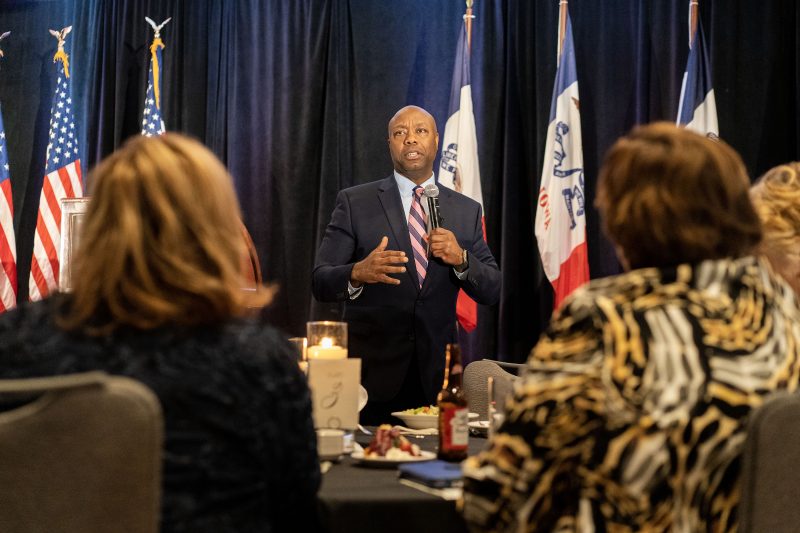Sen. Tim Scott, one of the country’s most prominent Black Republicans, will formally kick off his presidential campaign with a speech Monday in North Charleston, S.C., that comes after months of laying the groundwork for a pitch that stands apart from some others in the race.
Scott’s betting that an emphasis on his personal story, his Christian faith and a more optimistic message than some rivals, combined with significant campaign cash, will be enough to carry him to the Republican nomination. But he begins polling in the single digits against much better-known competitors. National surveys have former president Donald Trump with a wide lead, followed by Florida Gov. Ron DeSantis, who is also slated to enter the race this week.
Scott will launch his campaign at Charleston Southern University, his alma mater, with some high-profile Republican support. Sen. John Thune (R-S.D.) will lead the opening prayer, according to a person familiar with the matter, who spoke on the condition of anonymity to discuss previously undisclosed plans. Thune is the second-ranking Republican senator.
The South Carolina Republican starts the race with $22 million from his Senate campaign and has already made a $5.5 million ad buy in Iowa and New Hampshire that will run through the first GOP debate, currently scheduled for August. Ahead of Monday’s announcement, senior campaign officials touted Scott’s fundraising prowess, saying they think he has enough resources to be up on air between the day he announces until the New Hampshire primary starts.
The officials also highlighted his conservative record, including top ratings from the National Rifle Association and Susan B. Anthony Pro Life America. They argued that Scott is the most consistent conservative in the race, while also noting that Republican primary voters in South Carolina recently supported his 2022 Senate reelection.
Scott is the only Black Republican senator and at the moment is poised to be the only senator to enter a presidential race that’s set to include a former president, governors and a former vice president.
In some ways, Scott has struck a more optimistic tone about the country’s future than his rivals, talking of his vision for “a new American sunrise, even brighter than before.” But some Republicans doubt whether such a message will resonate in a party where anger has helped fuel the rise of Trump and DeSantis.
“Nothing would make me happier than a message of optimism resonating in today’s Republican Party,” said Joel Sawyer, a South Carolina-based political consultant. “Whether voters want to hear it or not is a completely different matter. All evidence points to grievance politics selling and working.”
At the same time, Scott has also shown a willingness to campaign in more combative tones. He has accused Democrats and liberals of pushing a “blueprint to ruin America.” In a video earlier this year announcing his intent to formally explore a run, Scott said he is uniquely suited to reject the “culture of grievance” and “victimhood” he said has been fostered by President Biden and “the radical left.”
In presenting their theory of the case, aides pointed to Scott’s February speech at Drake University in Des Moines.
“For those of you on the left, you can call me a prop, you can call me a token, you can call me the n-word, you can question my Blackness, you can even call me Uncle Tim,” Scott said in that address. “Just understand: Your words are no match for my evidence. Your pessimism is no match for my history. My existence shows your irrelevance.”
In addition to Trump and DeSantis, Scott faces fellow South Carolinian and former U.N. ambassador Nikki Haley. Several others are also considering entering the race, including former New Jersey governor Chris Christie and former vice president Mike Pence, who is expected to announce in June.
Although he only filed official paperwork Friday, Scott has effectively been running for president for some time. In April, he announced the formation of a presidential exploratory committee, which allows candidates to raise money and travel before officially entering a race. He has also been traveling for months to Iowa and New Hampshire as part of his “Faith in America” listening tour.
Shortly after his exploratory committee announcement, Scott struggled to answer specific questions about abortion restrictions. While he said he would “sign the most conservative pro-life legislation that they can get through Congress,” he added: “I’m not going to talk about six or five or seven or 10.” Scott, however, has said he would sign a 15-week national ban.
One question looming over Scott’s campaign is how he will approach Trump, even as his allies suggest he will not spend much time talking about the former president. During the Trump presidency, Scott helped sink two judicial nominees over their views on race.
He also met with Trump after the former president said there were “very fine people on both sides” following a white-nationalist rally in Charlottesville became violent. Scott has also highlighted the GOP tax cuts under Trump, including his work on opportunity zones, which provides a tax incentive for wealthy people to invest in low-income areas.
Trump has said little about Scott’s bid. However, after news of Scott’s paperwork filing, Trump posted on Truth Social a newspaper article from 2021 quoting the senator saying that he would “of course” support Trump if he ran in 2024.
“The key question for me is, are you prepared to tell Donald Trump to shut the hell up and get out of the race?” said Michael Steele, a former Republican National Committee chairman and vocal Trump critic. “If he’s not ready to take on Donald Trump, then he’s not ready to be president.”








